
The IMH Marshall Fellows Program supports the training of early career investigators in translational research, and aims to increase capacity in academic psychiatry.
The UBC Institute of Mental Health (UBC IMH), with the support of Sunny and Stewart Marshall, launched the IMH Marshall Fellows Program in Mental Health in 2019.
In line with the vision and commitment of the IMH and the donors, the Program invests in the training of young investigators, preparing them for careers dedicated to advancing understanding and treatment of psychiatric disorders.
About the Fellowships
- Applications for Fellowships are accepted between November 1 – January 31 each year.
- These internationally competitive fellowships are open to Canadian and international applicants who are within 5 years post-completion of a PhD in neuroscience or a related field, or 10 years post-completion of an MD.
- At least half of the awards each year are allocated to individuals with a medical degree to increase training capacity for clinician scientists in psychiatry.
- The program funds stipends of $75,000 per year (including benefits) for each Fellow with the option of competitive extension for a subsequent year.
- An additional travel allowance of $5,000 is provided for conference expenses where the Fellow is presenting.
- Additional information is provided in the Application Guidelines. For further information or questions regarding these awards, please contact Margaret Koshi, Director, Administration, at margaret.koshi@ubc.ca.
Announcing the IMH Marshall Fellows for 2025/2026

Dr. Leena Chau
Project Title: Development and randomized controlled trial evaluation of a culturally adapted digital mental health intervention for bipolar disorder
LEENA CHAU, PhD
Project Description:
“Bipolar disorder (BD) is one of the most common mood disorders experienced by people in Canada and worldwide. Globally, mood disorders are costly and can be associated with extreme personal and social impacts for the people experiencing them. Quality of life (QoL) is prioritized by people with BD, along with support for education and self-management, and emphasized in BD treatment guidelines. Recovery from BD therefore requires not only an improvement in symptoms, but also improvements in a person’s quality of life combined with knowledge about their condition and self-management skills. Currently, access to evidence-informed BD treatments is limited, especially in low-resource settings. Digital mental health interventions (DMHIs), particularly smartphone apps, are one promising way to improve BD treatment. Many apps exist for BD; however, few have been scientifically tested. Many of the available apps are poor quality, do not focus on BD or QoL specifically, are not developed with people with the condition, and are not culturally adapted to support widespread use.
The PolarUs app was developed by Michalak’s research team in close collaboration with people with BD to improve QoL and mood symptoms. PolarUs is a comprehensive app that provides users with information on effective BD treatments, education, and self-management skills. A pilot study was performed with 170 people with BD across North America. Results showed significant improvements in QoL and mood and also demonstrated the app’s usability.
This study builds on findings from the pilot study and seeks to: 1) culturally adapt the PolarUs app to French, Mandarin, and Spanish, the three most common languages in North America aside from English, and to 2) conduct a randomized controlled trial on the adapted apps with the different language groups in Canada and the United States. We will establish three project advisory groups with people with lived experience to support the cultural adaptation process in ensuring the PolarUs app is culturally appropriate and acceptable in the three different languages. We will also conduct three online focus groups to explore the experiences of people with BD (one in each language group). The final version of the adapted apps will be tested in the two countries with speakers of the three languages with BD, over a 12-week period. Results will provide evidence on whether the culturally adapted PolarUs app effectively improves QoL in people with BD.
This study is innovative in two main ways. First, it will be the first to test the effectiveness of a new evidence-based BD-tailored app focused on QoL outcomes. Second, it will be the first BD-tailored DMHI to be adapted for different cultural contexts closely involving users from the respective communities. The research processes will provide critical evidence for the app itself, but also more broadly for cultural adaptation and co-design methods in DMHI research around the world.”
Supervisor: Dr. Erin Michalak

Dr. Laura Labonté
Project Title: Defining clinically meaningful change in psychotic symptoms to better understand consequences for people living in precarious housing or homelessness
LAURA LABONTÉ, MD
Project Description:
“Social marginalization is an important risk factor for poor health and is associated with psychotic and substance use disorders, and other medical morbidity such as traumatic brain injury (TBI), human immunodeficiency virus (HIV) and hepatitis C (HCV) infection. Many substances used by marginalized people cause brief episodes of psychosis, which can be toxic for the brain itself, and be associated with worse outcomes such as increased hospital emergency department visits. We currently struggle to determine standardized methods to measure clinically meaningful changes in severity of symptoms of psychosis. Without such methods, changes in symptom severity are challenging to link to clinically relevant outcomes. Our study aims to assess to what extent individuals with such brain insults who also use substances, such as methamphetamine, are at increased risk of psychosis compared to those without brain insults. We will first define a standardized way of measuring clinically meaningful changes in psychotic symptoms over time and understand the factors that may predispose to such changes. Next, we will examine possible consequences such as emergency department visits. Finally, we will assess whether use of antipsychotic medication is associated with protection from clinically meaningful changes (increases) in psychotic symptoms over time, with or without exposure to stimulant drugs. Our analyses will use data from the Hotel Study, an ongoing longitudinal community-based study in Vancouver’s Downtown Eastside. This neighborhood consists of residents suffering from severe poverty, mental and physical illness, and addiction. The Hotel Study was designed to better characterize biological, psychological, and social factors affecting health of marginalized individuals. Participants underwent comprehensive assessments at study entry as well as monthly follow-up assessments looking at their prescription and non-prescription substance use, symptoms of psychosis, participated in annual assessments of their cognition and monitoring of emergency department visits over time. Statistical modelling will be used to help address study objectives. Having such information could help better guide clinicians in engaging and treating this vulnerable patient population and prevent chronic disability.”
Supervisor: Dr. William G. Honer

Dr. Victor Li
Project Title: Clinical effects of methadone on depressive symptoms in patients with long-term opioid prescriptions
VICTOR LI, MD
Project Description:
“Major depression remains a major area of need with a third of patients experiencing treatment resistance. Substantial research effort has been devoted to developing new antidepressant medications to fill the gap, with ketamine emerging as not only an effective but also rapid-acting antidepressant. This is especially valuable given that it takes current antidepressants around 4 weeks to show their full benefit. Ketamine is thought to work by blocking a specific type of glutamate receptor in the brain, called the NMDA receptor, and another drug with a similar mechanism at the same type of receptor is methadone, a widely used opioid medication with applications in pain control and substance use disorders.
Depression is common in those facing problems with substance use or pain, and it appears that having depression predisposes people to overuse opioids, and using opioids can predispose people to developing depression. It also appears that depressed patients with opioid use disorder do not respond as well to antidepressants either. Historically these individuals, often termed those with concurrent disorders, are understudied as they fit exclusion criteria for most major psychiatric studies, but their need for effective treatments is great. Methadone is already used frequently in those with pain or opioid use disorders, thus there may be a wealth of potential data to be collected to test the hypothesis that methadone has unrecognized antidepressant effects in this population.
Last year as a Marshall Fellow, I was involved with the Transitional Pain Clinic at Vancouver General Hospital, a specialty clinic that manages post-surgical patients who leave hospital with large opioid requirements, working to taper their use while maintaining pain control and preventing withdrawal over a 6-month period. These patients often have diagnosed depression or develop depression as part of their recovery course. We have obtained retrospective data over the last few years to capture mood symptoms over patients’ treatment courses and compare outcomes between patients on methadone versus those on other opioid medications which are not known to have effects on the NMDA receptor. We hypothesize that patients will do better from a mood perspective on methadone compared to being on other opioids. We are in the process of building a prospective observational component to complement this.
The outcomes of this project will provide further evidence for or against methadone as a rapid-acting antidepressant, particularly for people with pain or concurrent disorders, many of whom must remain on opioids for months to years. This project will lay the groundwork for a future randomized control trial that could inform clinicians around medication selection in these important but marginalized populations.”
Supervisors: Dr. Raymond W. Lam & Dr. Pouya Rezazadeh-Azar

Dr. Raheleh Mesbah
Project Title: Early intervention for individuals at high risk for bipolar disorder: A randomized clinical trial
RAHELE MESBAH, PhD
Project Description:
“Bipolar disorder is a serious mental health condition that affects over one million Canadians. It is marked by extreme mood swings, ranging from depressive lows to manic highs, which can cause difficulties with thinking, emotions, and relationships, as well as increase the risk of suicide. Early warning signs of bipolar disorder often appear during adolescence or young adulthood. However, many individuals remain undiagnosed for an average of 5 to 10 years. Several factors contribute to these delays, including self-stigma, limited awareness of the condition, and overlapping symptoms with other disorders. Unfortunately, the longer bipolar disorder goes untreated, the more negative consequences the affected individual experiences. These can include worsening symptoms, a greater risk of hospitalization, and a higher risk of suicide. Early and effective interventions that promote understanding of the condition and the warning signs, provide support, and reduce self-stigma in those at risk of developing bipolar disorder (i.e., those with a first-degree relative with bipolar disorder and/or showing sub-threshold symptoms of bipolar disorder) can significantly change these outcomes. However, no interventions to date have specifically aimed at improving help-seeking intentions or reducing stigma for individuals at risk of bipolar disorder.
Our research focuses on addressing this critical gap through a program called the Psychoeducational and Resilience Enhancement Program for those at risk of Bipolar Disorder (PREP-BD). In a previous pilot study, PREP-BD demonstrated promise in improving young people’s willingness to seek help, enhancing their understanding of BD, and fostering resilience. This program is delivered virtually, making it accessible to those who may face barriers to traditional in-person care. Building on the pilot study’s success, we aim to assess the effectiveness of PREP-BD through a randomized clinical trial. The study will include 76 participants aged 15–24 who are at high risk for BD. Participants will be randomly assigned to one of two groups: one receiving guided virtual group sessions led by trained facilitators and another accessing self-paced, interactive online materials. Both approaches cover identical topics, including recognizing early signs of bipolar disorder, managing stress, building resilience, and navigating mental health resources.
We will assess the program’s impact on various aspects of participants’ lives, including their willingness to seek help, knowledge of bipolar disorder, resilience, and quality of life. Additionally, we will explore whether the facilitator-led sessions provide added benefits compared to self-guided learning. Our main goal is to determine whether the facilitated program improves young people’s willingness to seek help.
This new educational program shows promise in helping individuals with bipolar disorder get diagnosed early and receive timely treatment, which can lead to the best possible outcomes and save costs for the healthcare system. By finding the most effective way to deliver this program, our study will help meet the urgent need for a program that is easy to access and cost-effective for people at high risk of developing bipolar disorder. The results will also set the stage for future efforts to improve and expand the program for more widespread use.”
Supervisors: Dr. Kamyar Keramatian & Dr. Lakshmi Yatham
Fellows 2024/2025

Dr. Nicholas Ainsworth
Project Title: Measuring response to L-DOPA challenge as a biomarker for outcomes in late-life depression: A pilot clinical trial
NICHOLAS J. AINSWORTH, MD
Project Description:
“Late-life depression (LLD) significantly impacts older adults, increasing risks of cognitive decline, poor physical health outcomes, and reduced quality of life. Although various medications are effective for most LLD cases, not all respond to initial treatments. Those with treatment-resistant LLD are more prone to physical frailty and cognitive deficits, often linked to psychomotor slowing – a decrease in the speed of physical movements and cognitive processing.
Psychomotor slowing can indicate more severe illness and worse outcomes in LLD, yet its relationship with treatment response remains unclear. Aripiprazole, a medication added to standard antidepressants, partially mimics dopamine activity, which is implicated in psychomotor slowing. This study explores whether psychomotor slowing can predict who will benefit from aripiprazole treatment.
In this pilot clinical trial, we use the dopamine analogue levodopa (L-DOPA) to assess changes in psychomotor slowing and predict treatment outcomes. Participants’ walking speed, an estimate of psychomotor slowing, is measured before and after two weeks of daily L-DOPA administration. Changes in walking speed will estimate the psychomotor response to L-DOPA. Following this, participants undergo a 12-week aripiprazole treatment, with depression symptoms and cognitive function assessed before and after treatment.
We hypothesize that those showing increased walking speed post-L-DOPA will also experience improvements in depression and cognitive function with aripiprazole. This research aims to understand the link between LLD, psychomotor slowing, and dopamine system modification, ultimately seeking to provide targeted treatments for older adults with depression, cognitive difficulties, and physical health challenges.”
Supervisors: Dr. Sophia Frangou & Dr. Benoit H. Mulsant

Dr. Abhijit Chinchani
Project Title: Transcranial alternating current stimulation (tACS) for improving information-gathering impairments using eye movements in schizophrenia
ABHIJIT CHINCHANI, PhD
Project Description:
“Schizophrenia is a complex disorder with an array of symptoms, with delusions being one of the most prevalent symptoms. Patients also experience various negative symptoms, including cognitive and oculomotor impairments. Restricted exploratory eye movements during natural viewing tasks are one of the most commonly reported impairments. This suggests a tendency for patients to show impairments in information gathering, possibly contributing to premature termination of evidence collection and impairments in collecting evidence that disconfirms a belief. Therefore, eye movements may provide a window to delusional thoughts. In recent years, there has been an increased interest in leveraging non-invasive neuromodulation treatments to address behavioral impairments by targeting the neural mechanisms underlying such behaviors. Transcranial alternating current stimulation (tACS), involving applications of weak electrical currents to the scalp, is one such technique capable of modulating brain oscillations at specific frequencies. Notably, recent findings from Dr. Woodward’s lab index reliable task-dependent effects of tACS on brain oscillations. Building upon this research, our goal is to use tACS to modulate brain oscillations associated with restricted exploratory eye movements in healthy people and patients with schizophrenia. By doing so, we aim to investigate whether this modulation could lead to improvements not only in the oculomotor domain but also in other symptomatic manifestations, such as information gathering, evidence integration, and ultimately delusions. Our research underscores the importance of integrating cutting-edge neuroscience techniques with clinical insights to advance the treatment and understanding of this complex disorder.”
Supervisor: Dr. Todd S. Woodward

Dr. Laura Labonté
Project Title: Risk factors for cognitive impairment and substance-induced psychosis in people living in precarious housing or homelessness
LAURA LABONTÉ, MD, PhD
Project Description:
“Social marginalization is an important risk factor for poor health and is associated with psychotic and substance use disorders, traumatic brain injury (TBI), human immunodeficiency virus (HIV) and hepatitis C (HCV) infection. Substance use and brain insults, such as TBIs, are associated with worse outcomes and functional impairment as they can damage brain function. Many substances used by marginalized people also cause brief episodes of psychosis, which can be toxic for the brain itself. We do not yet know the extent to which these insults may contribute to premature cognitive impairment and increased severity of psychotic symptoms, or if antipsychotic treatment is effective in mitigating their effects. This study aims to assess to what extent individuals with such brain insults who also use substances, such as opioids and methamphetamine, are at increased risk of cognitive impairment or of psychosis compared to those without brain insults. We also aim to determine whether certain types of cognitive problems are associated with increased susceptibility to psychosis and if using antipsychotic medications can decrease the frequency and severity of psychotic symptoms. This study will use data from the Hotel Study, an ongoing longitudinal community-based study in Vancouver’s Downtown Eastside. This neighbourhood consists of residents suffering from severe poverty, mental and physical illness, and addiction. The Hotel Study was designed to better characterize biological, psychological, and social factors affecting health of marginalized individuals. Participants underwent comprehensive assessments at study entry as well as monthly follow-up assessments looking at their prescription and non-prescription substance use, symptoms of psychosis and participated in annual assessments of their cognition along with brain imaging. Statistical modelling will be used to help address study objectives. Having such information could help better guide clinicians in engaging and treating this vulnerable patient population and prevent chronic disability.”
Supervisor: Dr. William G. Honer

Dr. Victor Li
Project Title: Clinical effects of methadone on depressive symptoms in patients with long-term opioid prescriptions
VICTOR LI, MD, PhD
Project Description:
“Major depression is a significant issue, with a third of patients experiencing treatment resistance. Despite efforts to develop new antidepressants, ketamine has emerged as a rapid-acting solution, taking effect much faster than traditional antidepressants. Ketamine works by blocking NMDA receptors in the brain, a mechanism similar to methadone, an opioid used for pain control and substance use disorders.
Depression is prevalent among individuals with substance use or pain issues, creating a cycle where depression predisposes opioid overuse and vice versa. Depressed patients with opioid use disorder often don’t respond well to standard antidepressants. These patients, termed those with concurrent disorders, are understudied but have a critical need for effective treatments. Given methadone’s widespread use in pain and opioid use disorders, there may be untapped data suggesting its potential antidepressant effects.
At the Transitional Pain Clinic at Vancouver General Hospital, we manage post-surgical patients with high opioid needs, aiming to taper their use while controlling pain and preventing withdrawal over six months. These patients frequently have or develop depression. We propose an observational study to track mood symptoms in patients treated with methadone versus other opioids without NMDA receptor effects. We hypothesize that methadone will lead to better mood outcomes compared to other opioids.
This study aims to provide evidence on methadone’s potential as a rapid-acting antidepressant, particularly for those with pain or concurrent disorders. It will lay the groundwork for a future randomized control trial to guide clinicians in medication selection for these marginalized populations.”
Supervisor: Dr. Raymond W. Lam

Dr. Kirsten Marchand
Project Title: Investigating what matters to youth: A mixed-methods study of youth-centred opioid treatments and their outcomes
KIRSTEN MARCHAND, PhD
Project Description:
“Since 2016, approximately 8,000 adolescents and young adults between the ages of 15 and 29 have died from opioid-related overdoses in Canada. This has left families and communities to mourn the loss of their loved ones. Harms of unregulated opioid use, like overdoses, illnesses, and hospitalizations, can be avoided by getting youth the help they need, as early as possible. However, most of the currently available help has focused on adults, under the assumption that what works for adults will also work for youth. Unfortunately, research in British Columbia has recently found that this is not the case. Instead, existing options for help do not meet youths’ opioid treatment needs and preferences. The main goal of this study is to determine how to best help youth who use opioids. To meet this objective, we will carry out a two-year research study. In the first year, we will look into what different types of treatments, services, and supports have been researched for youth using opioids. We will then engage youth, parents/caregivers, service providers, and decision-makers on their ideas about how these different treatments could be improved for youth and how to know when treatments are working for youth or not. In the second year, we will carry out research using large datasets collected in British Columbia to understand which youth receive these different treatments and how well they work for youth. This study will help service providers and policy makers to deliver opioid treatments in a way that will better meet youths’ unique needs. The findings will also help future researchers to make sure that they are studying what matters most to youth.”
Supervisor: Dr. Skye Barbic
Fellows 2023/2024
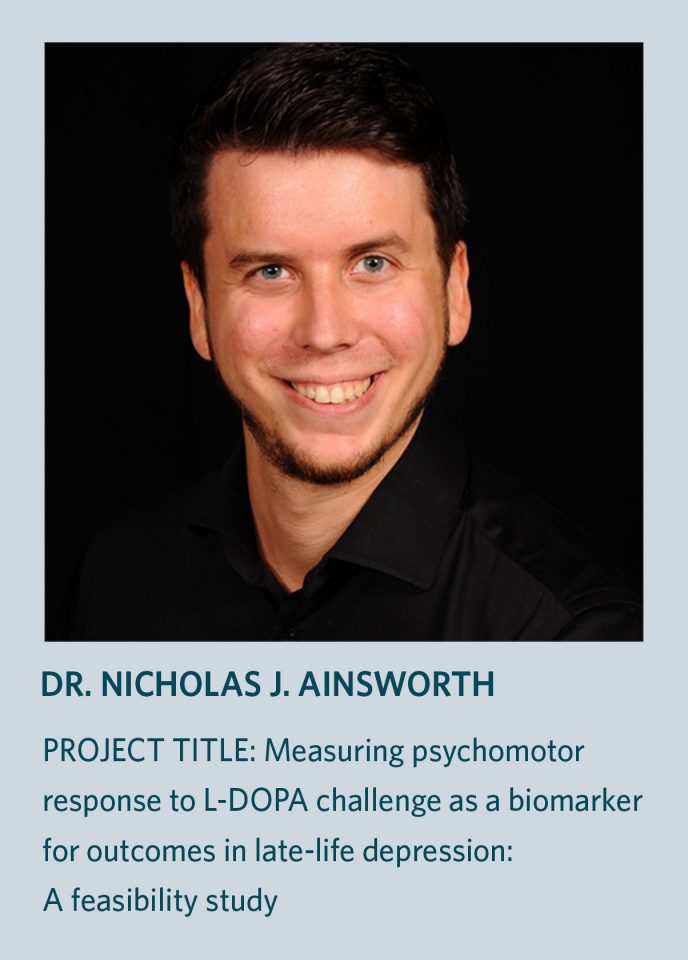
NICHOLAS J. AINSWORTH, MD
Project Description:
“My current research focuses on pharmacotherapy of major depressive disorder (MDD) in late life (late-life depression; LLD), with a particular interest in the cognitive and physical outcomes of LLD treatment. LLD has been associated with poor cognitive outcomes, including an increased risk of developing dementia. In addition, LLD is frequently comorbid with physical disorders and frailty, which can lead to worse clinical outcomes.
This project builds on recent advances in the evidence supporting a link between dopaminergic system dysfunction and LLD, as well as the link between exposure to levodopa (L-DOPA), a dopamine precursor, and improvements in both dopaminergic neurotransmission and behavior (i.e., psychomotor slowing). My aim is to test whether psychomotor response to a L-DOPA challengepredicts response to aripiprazole augmentation in LLD. My overall objective is to investigate the relationship among psychomotor slowing, responsiveness to a L-DOPA challenge, and LLD outcomes in older adults with LLD who are receiving aripiprazole augmentation to standardized antidepressant treatment.”
Supervisors: Dr. Sophia Frangou & Dr. Benoit H. Mulsant
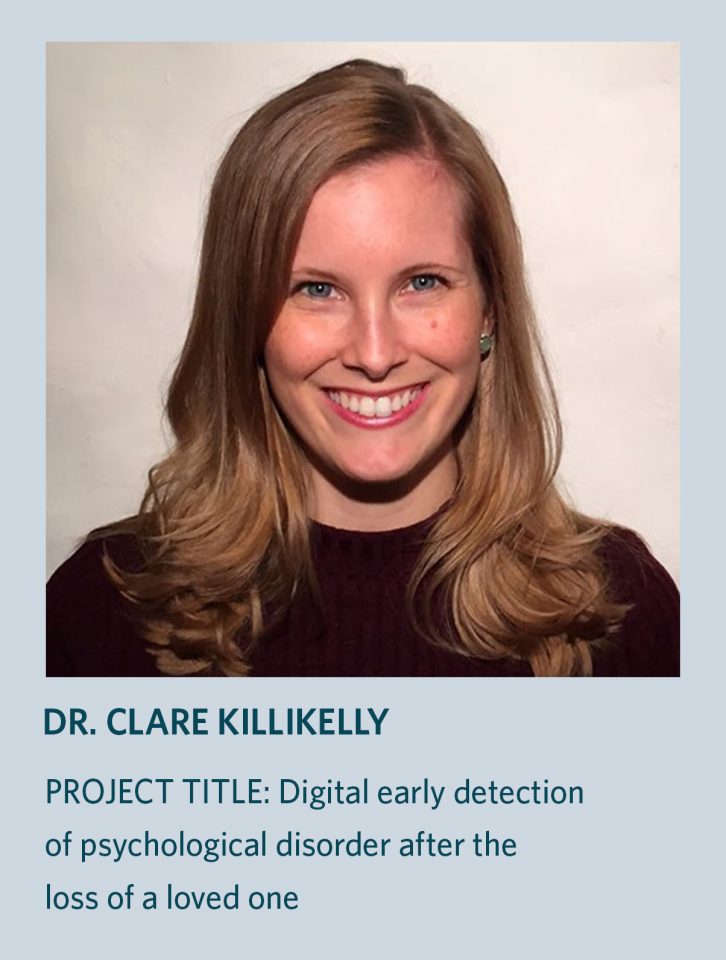
CLARE KILLIKELLY, PhD
Project Description:
“Worldwide, the rates of mental health disorders have skyrocketed since the start of the COVID-19 pandemic in 2019, and researchers and clinicians have been preparing for a ‘shadow’ pandemic of bereavement-related mental health disorders. A stressful life event, such as the death of a loved one, may produce a sequela of overlapping psychological and emotional symptoms. However, the aetiology of different stress-related disorders such as PGD and PTSD remains widely an open question.
The primary aim of my project is to detect early digital markers of clinical disorder and sub-clinical symptoms following bereavement. This study is the first to use real-time data to support early screening and inform disorder prevention, and to examine psychological sequelae of bereavement using longitudinal and experience sampling methods (ESM) mobile app methodology and examine the onset and course of multiple disorders following bereavement. Systematic, large-scale, robust data on the psychological sequelae following bereavement will provide much needed evidence on how and when PGD develops, who is at risk, and how the symptoms unfold. The development of guidelines for treatment and prevention can only be effective when we know when and how PGD develops. The development of a digital early detection system for disorder will provide clinicians and patients with an easy to use, data rich system that may be adapted for different clinical and research purposes.”
Supervisor: Dr. John Ogrodniczuk
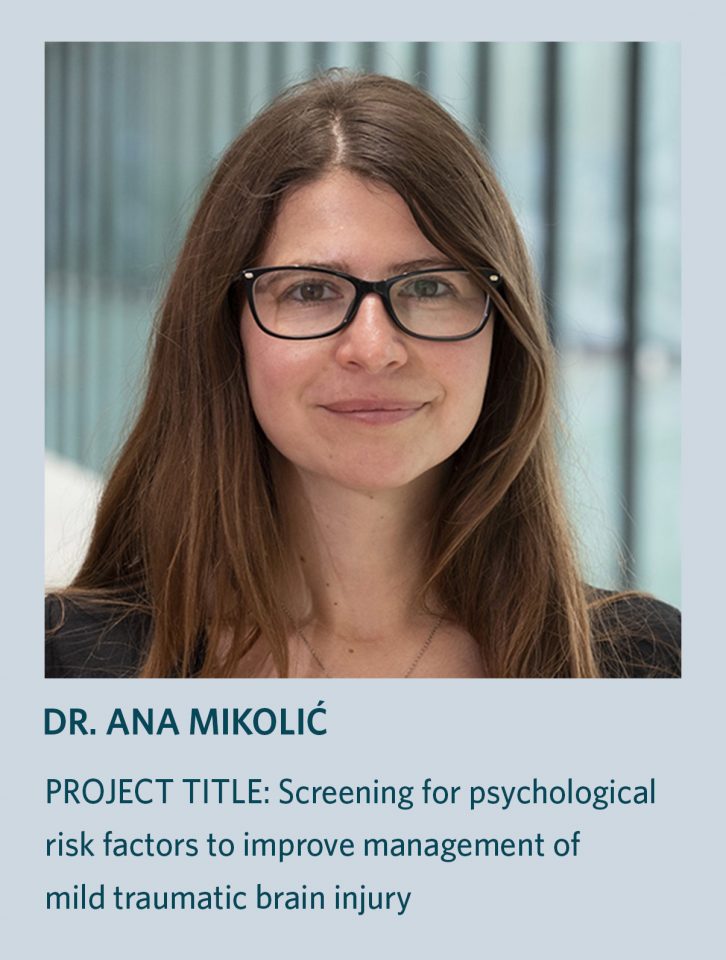
ANA MIKOLIĆ, PhD
Project Description:
“Each year, at least 200,000 Canadians sustain a mild traumatic injury (mTBI). The term ‘mild’ in the diagnosis is misleading because many people experience longer-term neuropsychiatric sequelae after mTBI, including emotional, cognitive, and physical symptoms. Identifying who is at increased risk of persistent symptoms and disability after mTBI in adults has been a major challenge. A major barrier to assessing psychological factors in clinical practice is requiring a lengthy battery of questionnaires. To address this, our team used a preexisting tool and adapted it for mTBI, hereafter referred to as the STarTConcussion (STaRT-C).
My study will be the first to examine the value of the STarT-C tool for improving the identification of adults at-risk of poor outcomes following mTBI. The primary aim of this project is to investigate the additional predictive value of the STarT-C tool for outcomes following mTBI in different clinical settings. We expect that the STarT-C tool will improve prediction of outcomes following mTBI, over and above readily available demographic and clinical variables, validating it as an efficient and clinically useful risk stratification tool for adults with mTBI.”
Supervisors: Dr. Noah Silverberg & Dr. William Panenka
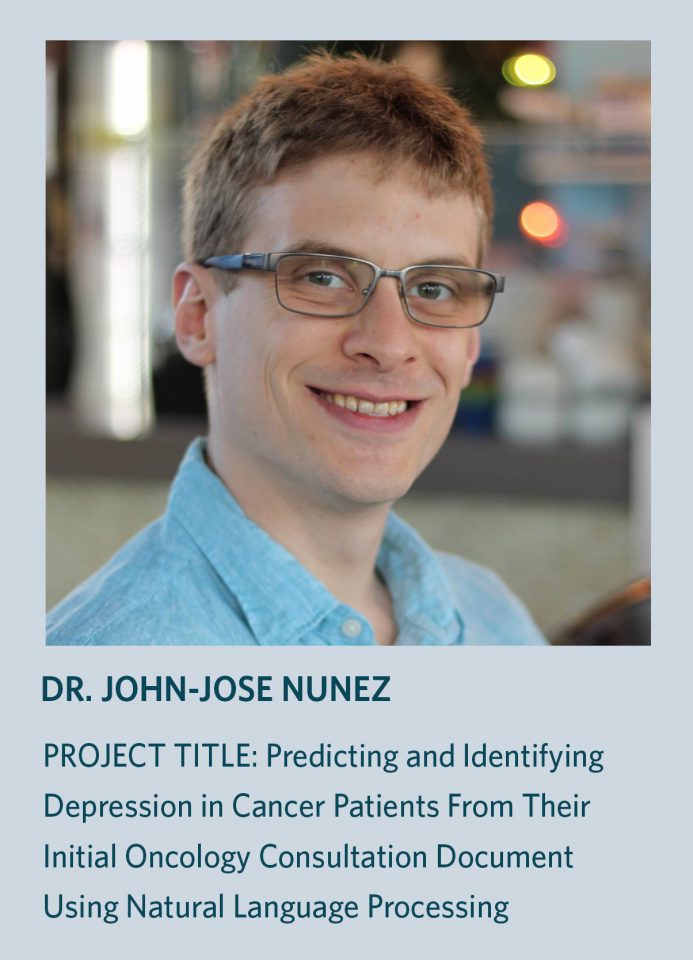
JOHN-JOSE NUNEZ, MD
Project Description:
“Cancer is a common disease that can impact both our physical and mental health. Cancer patients become depressed about three times as often as the general population, which can not only worsen their quality of life, but also decrease their chance of surviving cancer longer, possibly because depressed cancer patients find it harder to follow through with treatment. Cancer centres like BC Cancer employ psychiatrists and counsellors to help cancer patients with mental illnesses like depression, however it can be hard for patients to access these resources. We want to build an artificial intelligence that uses natural language processing to identify which patients are depressed or at risk of becoming depressed, which may help them get the care they need.
In this project, we want to build this artificial intelligence further so it can be used at a patient’s first cancer appointment to identify which cancer patients are currently depressed, or may become depressed in the following year. We will again have the artificial intelligence use natural language processing to read the document the oncologist writes after the first visit. We believe that the artificial intelligence may be able to predict depression even better than it could predict which cancer patients will see a psychiatrist. We think it might be easier for it to predict just one illness instead of the many different illnesses a patient can see a psychiatrist for. This project aims to identify and predict depression better in cancer patients, allowing them to get the help they need as soon as possible, and improve both their physical and mental health.”
Supervisor: Dr. Raymond Lam & Dr. Alan Bates
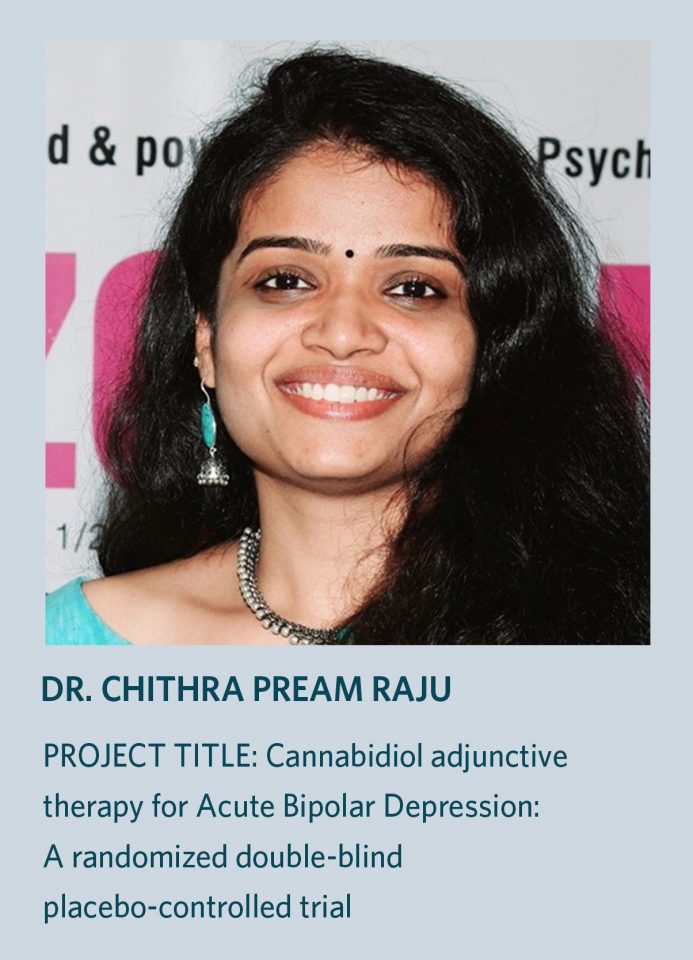
CHITHRA PREAM RAJU, MD
Project Description:
Bipolar disorder (BD) is a severe mental illness that results in significant disability and burden. The lifetime prevalence of BD is 2.4-4.4%. Patients with BD spend half their lives experiencing symptoms despite treatment, with depressive symptoms three times more common than manic symptoms, resulting in significant socio-occupational and family dysfunction. Yet, only three medications are approved by the Health Canada for treatment of the depressive phase of BD. Thus, developing new treatments that are effective and have a good safety profile is an urgent unmet need for people with BD.
Pre-clinical studies in mice have shown that cannabidiol may have antidepressant properties. As well, studies in patients with various medical conditions showed that cannabidiol may improve depressive symptom. In a pilot study, we have found a signal for antidepressant effects of cannabidiol in bipolar depressed patients. Based on the
above, we are conducting a randomized double-blind placebo controlled clinical trial to assess the efficacy and safety of cannabidiol in treating acute bipolar depression, which will allow us to determine if improvement in depression is greater in the cannabidiol group vs placebo group. It is noteworthy that all the participants will continue using their usual medication during the study. The findings of this study will help us to determine if adjunctive cannabidiol is a safe and effective treatment for acute bipolar depression.
Supervisor: Dr. Lakshmi Yatham
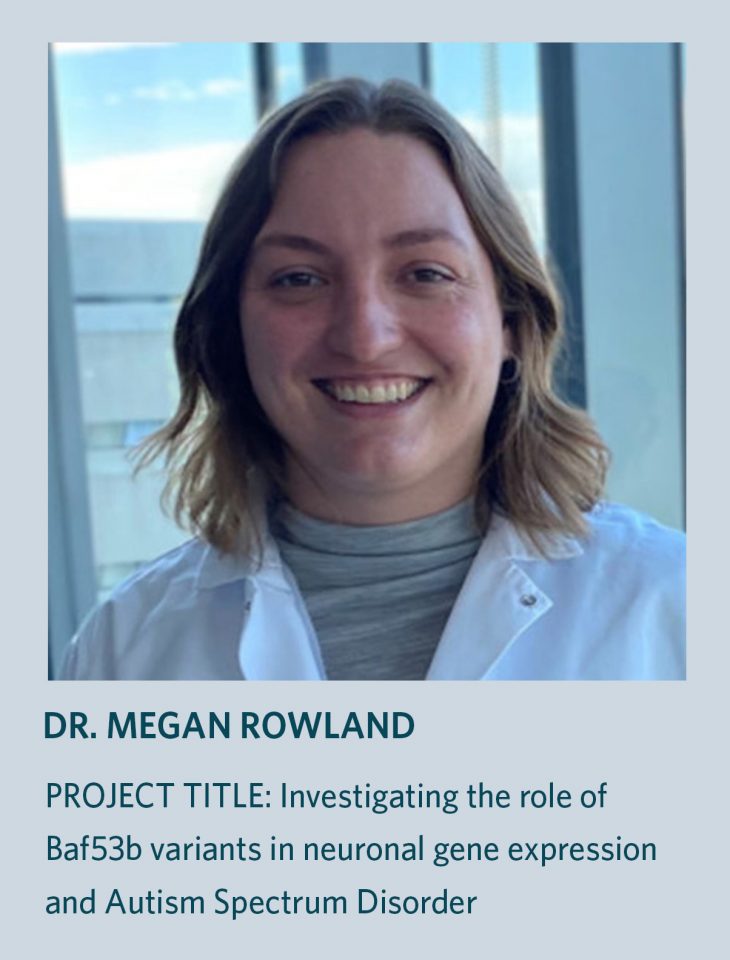
MEGAN ROWLAND, PhD
Project Description:
“Autism spectrum disorder (ASD) is one of the most prevalent forms of developmental brain disorders, affecting 1 in 66 children in Canada. ASD is characterized by impairments in social communication, restricted interests, and repetitive behaviours which can be a significant burden on families, social services and the healthcare system. It is well established that ASD is heritable, however, there are hundreds of genes that have been implicated. One group of genes that are of particular interest are part of the Brg1 Associated Factor (BAF) complex. Despite the evidence that mutations in the BAF complex are connected to ASD development, it is still unclear how mutations in the BAF complex actually lead to ASD.
A novel, neuron specific version of the BAF complex has emerged as a promising candidate. Deletion of Baf53b, one of the neuronal subunits in the BAF complex, causes neuron defects and impairments to long-term memory and social behaviours in rodent models. Recently, mutations in BAF53B have been identified in individuals with ASD and BAF53B was found to be the most frequently mutated gene in the Simons Recessive Autism Cohort. My study investigates the role of Baf53b specifically in parvalbumin (PV) inhibitory neurons in mice. PV neurons are the most abundant type of inhibitory neuron in the brain and are frequently impaired in ASD. After deleting Baf53b in PV neurons, I found that the mice had alterations to their communication, increased repetitive behaviours and memory deficits. These phenotypes reflect the hallmark behavioural repertoire observed in children with ASD and validate a key role for Baf53b in the development of ASD-relevant behaviours. My next objective is to assess how ASD associated genetic variants of BAF53B contribute to neurodevelopmental impairments. I hypothesize that BAF53B ASD-associated variants will negatively impact regulation of parvalbumin neuron gene expression leading to impaired neuronal development and ASD-relevant behaviours in mice.
By providing insight into the etiology of ASD, this work will provide the foundation for future rescue experiments to identify novel therapeutic targets for ASD.”
Supervisor: Dr. Annie Ciernia
Fellows 2022/2023

THOMAS CHAO, PhD
Project Description:
“People with concurrent disorders (PCD) have worse mental health and treatment outcomes than any other mental health group. Research on PCD and their treatment outcomes is severely lacking, as they are often excluded from studies due to the severe and complex nature of their disorders. With 1,500 planned participants, ROAR-CANADA is assembling the largest sample of people with concurrent disorders worldwide. For the past year, we have been successfully running ROAR CANADA at 4 sites in BC and Ontario. This 5-year Health Canada-funded project collects a wealth of unprecedented information pertaining to patient profiles, as well as unique information, such as self-report data on victimization and violence and administrative data, before and after the concurrent disorder treatment.
My project aims to enrich the current assessment protocol with the inclusion of neurocognitive tests and measures of stress, including biomarkers of acute and general stress. Cognitive functioning and stress have been shown to impact treatment outcomes across substance-using and mental health populations, but they have not been studied in PCD as a single clinical group. The knowledge obtained through this study will contribute to a more comprehensive assessment of concurrent disorders, and the risk factors and prevention strategies for overdose and relapse.”
Supervisor: Dr. Christian Schütz
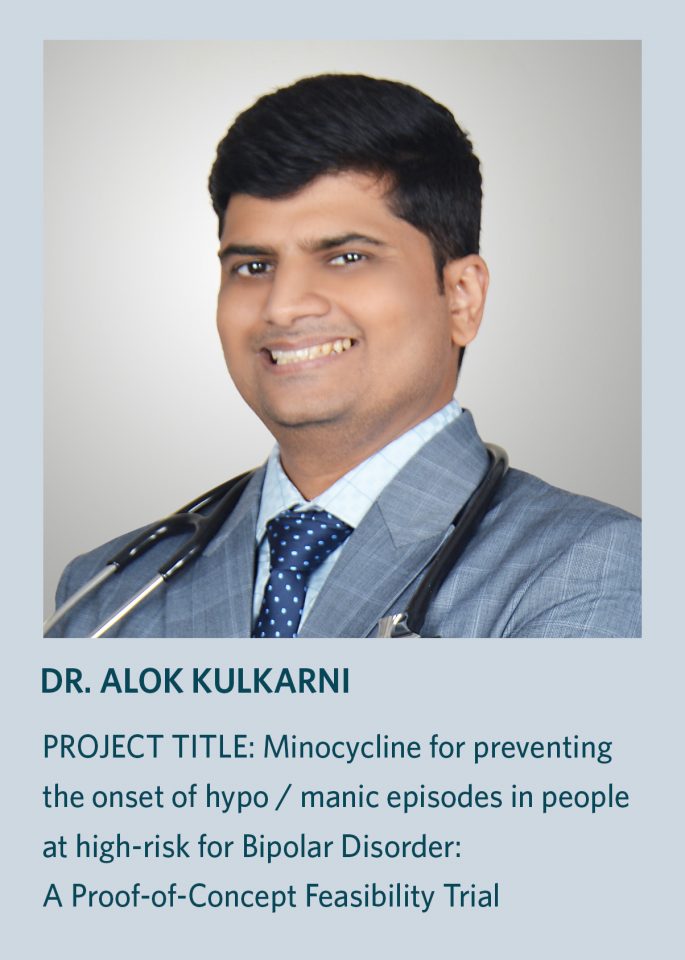
ALOK KULKARNI, MD
Project Description:
“Bipolar disorder (BD), is a severe mental illness characterized by dramatic shifts in mood, energy, and activity levels causing substantial impairment in interpersonal and social functioning. The disease course has recurrent periods of highs (mania) and lows (depression) in a person’s mood and activity levels. Globally, BD is the 4th leading cause of disability in the 15-24 year old age group. It is associated with substantial functional impairment, and carries with it a high risk of suicide. Treatment outcomes have remained poor in BD. Previous research entailing early interventions has shown sub-optimal results making the case for even earlier interventions.
Our current study will identify persons who are at high-risk to develop BD, and compare the effectiveness of a medication, minocycline, as compared to the placebo, in preventing the emergence of the aforementioned periods of highs and lows. Research has identified inflammation as the primary contributor for the progression of BD. As minocycline is an antibiotic commonly used to treat acne in adolescents given its anti-inflammatory properties, it has great potential to arrest the disease progression by its anti-inflammatory and anti-oxidant actions. We hypothesize that fewer high-risk subjects receiving minocycline will experience mood episode(s) as against those receiving the dummy pills during the 1-year study period. If our hypothesis turns out to be true, it will provide the impetus for a larger and more definitive clinical trial. If minocyclin’s effectiveness is confirmed in preventing BD in high-risk subjects, it will transform the clinical management of BD.”
Supervisor: Dr. Lakshmi Yatham
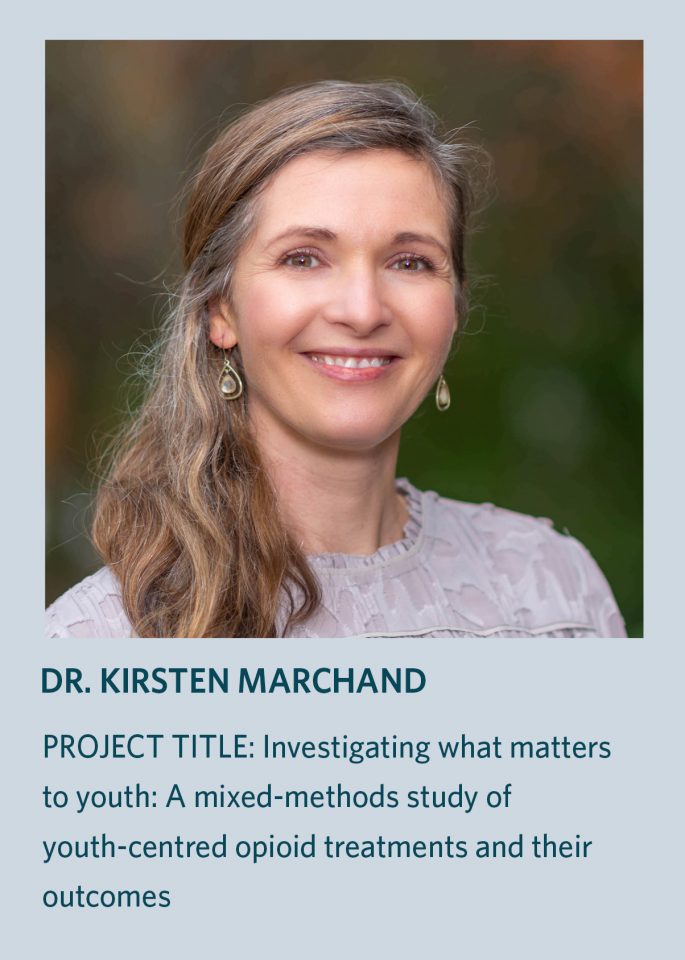
KIRSTEN MARCHAND, PhD
Project Description:
“Since 2016, approximately 5,000 adolescents and young adults between the ages of 15 and 29 have died from opioid-related overdoses in Canada. This has left families and communities to mourn the loss of their loved ones. These overdose deaths can be avoided by getting youth the help they need, as early as possible. However, most of the currently available help has focused on adults, under the assumption that what works for adults will also work for youth. Unfortunately, research in British Columbia has recently found that this is not the case. Instead, existing options for help do not meet youths’ opioid treatment needs and preferences.
The main goal of this study is to determine how to best help youth who use opioids. To meet this objective, we will engage youth, parents/caregivers, and service providers in a research study. This study will explore priorities for opioid use treatment delivery. It will also determine how to best define the benefits of opioid use treatment for youth. These findings will then be used to study how well youths’ priorities are being met by available treatments and services across British Columbia. The findings of this study will help service providers and policy makers to deliver opioid treatments in a way that will better meet youths’ unique needs. The findings will also help future researchers to make sure that they are studying what matters most to youth.”
Supervisor: Dr. Skye Barbic
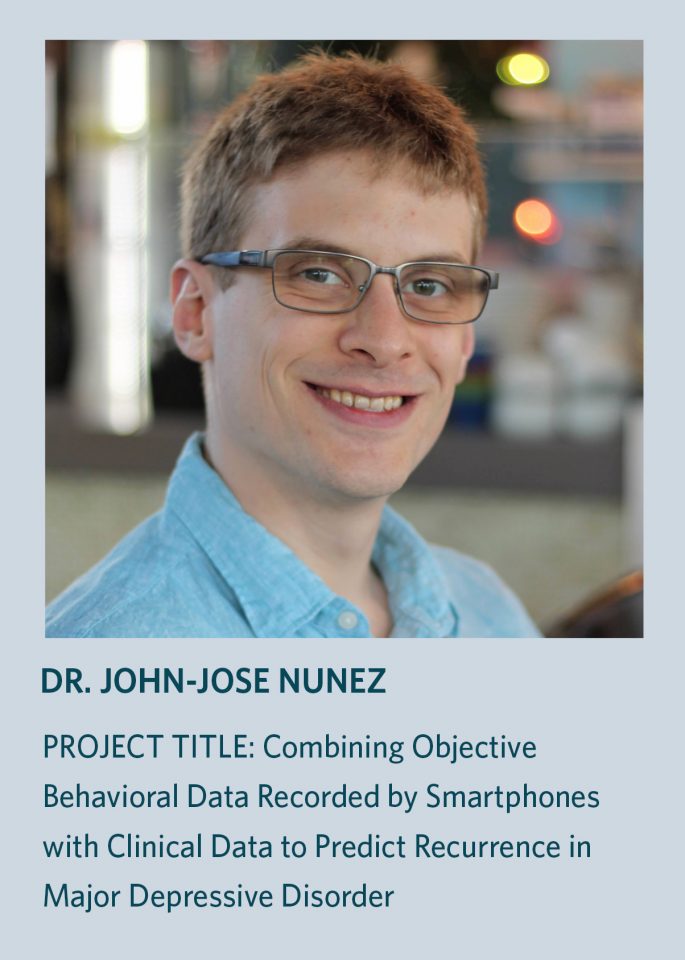
JOHN-JOSE NUNEZ, MD
Project Description:
“This project will use computerized ‘machine-learning’ to predict if, and when, a patient’s depression will recur after being treated successfully. If we can use machine learning to accurately predict when a patient’s depression is just starting to return, we may be able to offer extra medications or therapy to stop it from worsening. Depression is the second-biggest cause of disability around the world, and most patients will have more than one episode, so a prediction that works well would be clinically useful.
So far, researchers have used smartphone data by itself to predict when a patient’s depression will recur. In this project, we want to improve these predictions by training our algorithms with additional clinical data, such as other illnesses they have and how quickly their depression has improved with treatment in the past. Using both smartphone and clinical data from a recent study we completed, we will train algorithms using machine learning to predict when patients’ depression will recur. This will determine if clinical data can improve the accuracy of prediction with smartphone data alone. Our study has more patients and more comprehensive clinical data than researchers have previously used, which may also increase our ability to predict recurrence. We hope that a more accurate prediction of depression recurrence will help doctors and mental health clinicians to keep patients depression free by earlier treatment before their depression returns.”
Supervisor: Dr. Raymond Lam
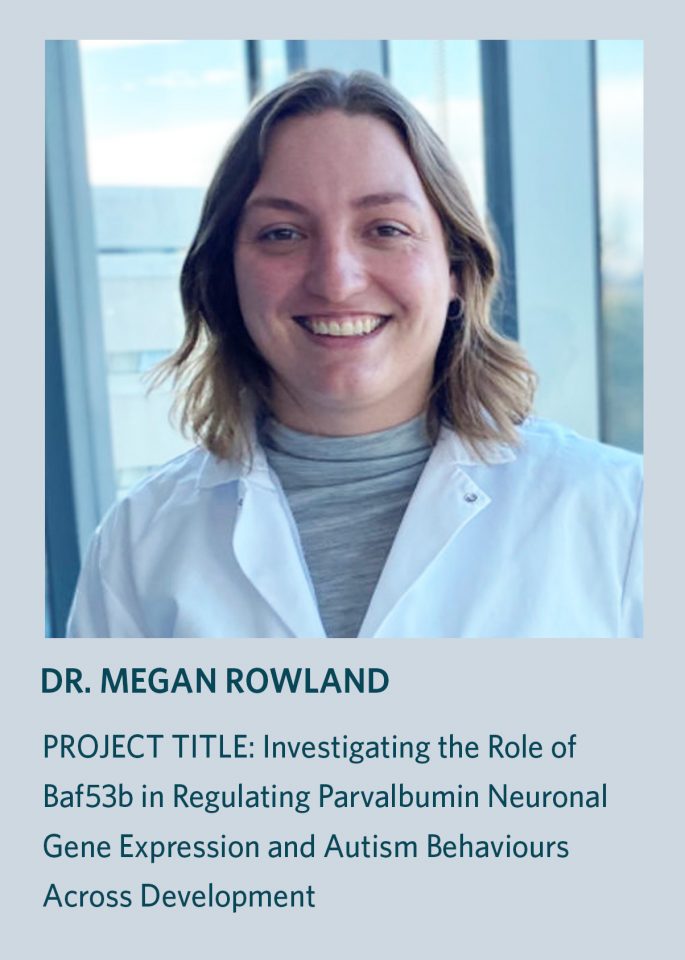
MEGAN ROWLAND, PhD
Project Description:
“Autism spectrum disorder (ASD) is one of the most prevalent forms of developmental brain disorders, affecting 1 in 66 children in Canada. ASD is characterized by impairments in social communication, restricted interests, and repetitive behaviours which can be a significant burden on families, social services and the healthcare system. It is well established that ASD is heritable, however, there are hundreds of genes that have been implicated. One group of genes that are of particular interest are part of the Brg1 Associated Factor (BAF) complex. Mutations in the BAF complex have recently been linked to ASDs but it is still unknown how mutations in BAF genes actually lead to ASDs. A novel, neuron specific version of the BAF complex has emerged as a promising candidate.
My project will investigate the loss of the neuronal BAF complex specifically in parvalbumin (PV) inhibitory neurons in mice. I hypothesize that loss of the neuronal BAF complex in PV neurons will alter gene expression that is necessary for proper function resulting in ASD-like behaviours. To understand the underlying cause of any behavioural changes, we will employ next generation sequencing to investigate alterations in gene expression and DNA structure in neurons that have lost the neuronal BAF complex. The proposed research represents a unique interface between neuroscience and computational biology for understanding gene expression in ASDs. By providing insight into the etiology of ASD, this work will provide the foundation for future rescue experiments to identify novel therapeutic targets for ASD.”
Supervisor: Dr. Annie Ciernia
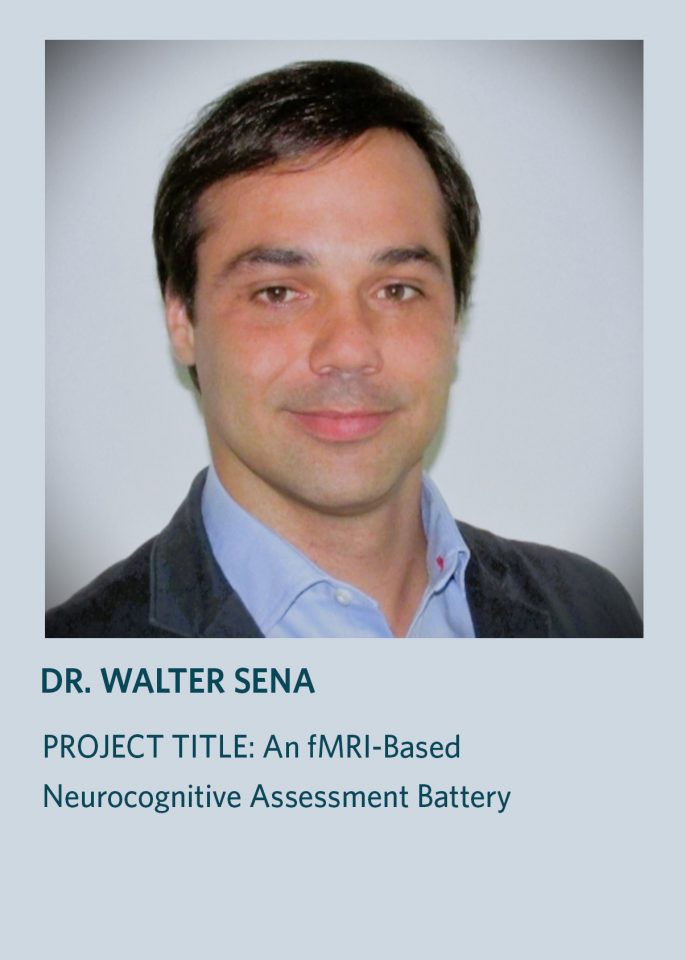
WALTER SENA, MD
Project Description:
“Cognitive assessment has been a staple of medical treatment for over 50 years, used for diagnosis and treatment planning of patients with neurocognitive disorders. Functional magnetic resonance imaging (fMRI), although it measures brain activity of cognitive processes, has not yet been used clinically in cognitive assessments.
My project aims to help incorporate fMRI knowledge into clinical practice by proposing an fMRI-specific cognitive assessment procedure, including a novel normed fMRI-specific testing battery. If successful, this research will develop the first fMRI-based neurocognitive assessment battery that can be used for the diagnosis and treatment planning of patients with neurocognitive disorders.”
Supervisor: Dr. Todd Woodward
Fellows 2021/2022
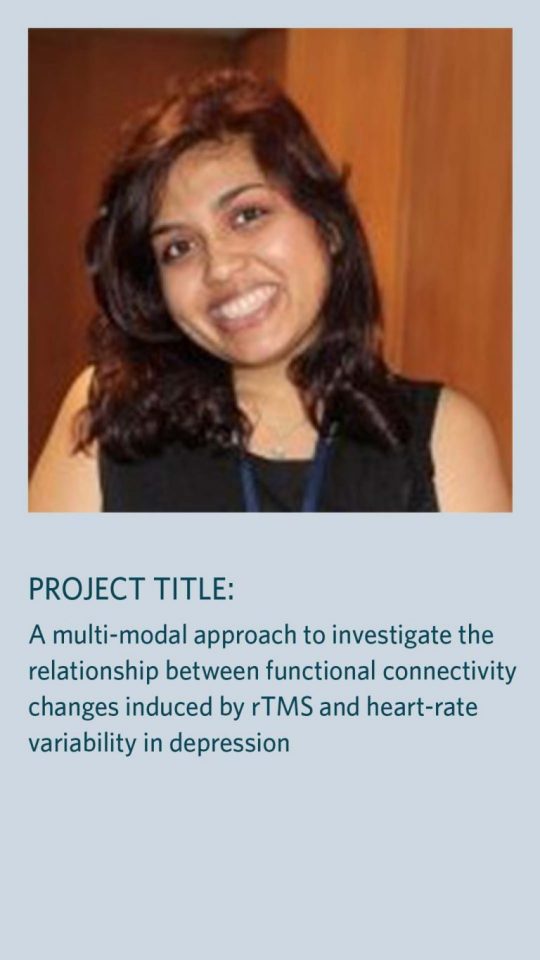
DR. KOMAL BHARTI
FELLOW
Dr. Bharti’s study will build upon on a recent CIHR-funded project in the NINET lab, which aims to investigate an association between the neural correlates of functional disturbances in the dorsolateral prefrontal cortex (DLPFC ) and subgenual anterior cingulate cortex (sgACC ) of major depressive disorder (MDD) and the heart rate variability (HRV) via a combined “TMS-fMRI-HRV” study. She will investigate the dynamic interaction and relationship between the functional connectivity (FC) in the brain and high frequency heart rate variability (HF HRV) in MDD patients, and develop a neuroimaging pipeline to examine the dynamic temporal interaction between FC during rTMS and HRV, providing an overview of dynamic functional interaction and interplay between HF HRV and functional association between the DLPFC and the sgACC with an approximate estimation of patients who respond in treatment-resistant depression and show symptom improvement.
Supervisor: Dr. Fidel Vila-Rodriguez
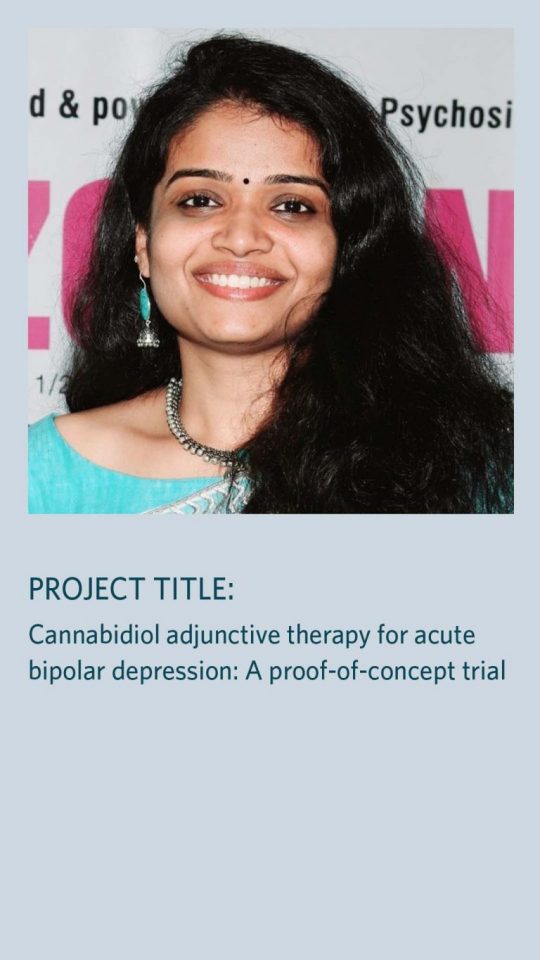
DR. K CHITHRA
FELLOW
As cannabidiol (CBD) has been shown to be a safe medication with few adverse effects in bipolar depressed patients and likely has antidepressant effects, Dr. Chithra’s project will to test CBD as a treatment for the depressive phases of bipolar disorder (BD) in a randomized clinical trial. This pilot study will be used to assess the feasibility and safety of CBD and to gauge signal for efficacy of CBD. In this study, Dr. Chithra will divide the participants into two groups, one of which will receive daily capsules containing CBD, while the other will receive matching placebo capsules for 8 weeks. The aim will be to determine if improvement in depression is greater in the CBD group vs placebo group. As all participants will continue using their usual medication during the study, the findings will open up possibilities to investigate adjunctive CBD for the treatment of acute bipolar depression in large multicentre trials.
Supervisor: Dr. Lakshmi Yatham
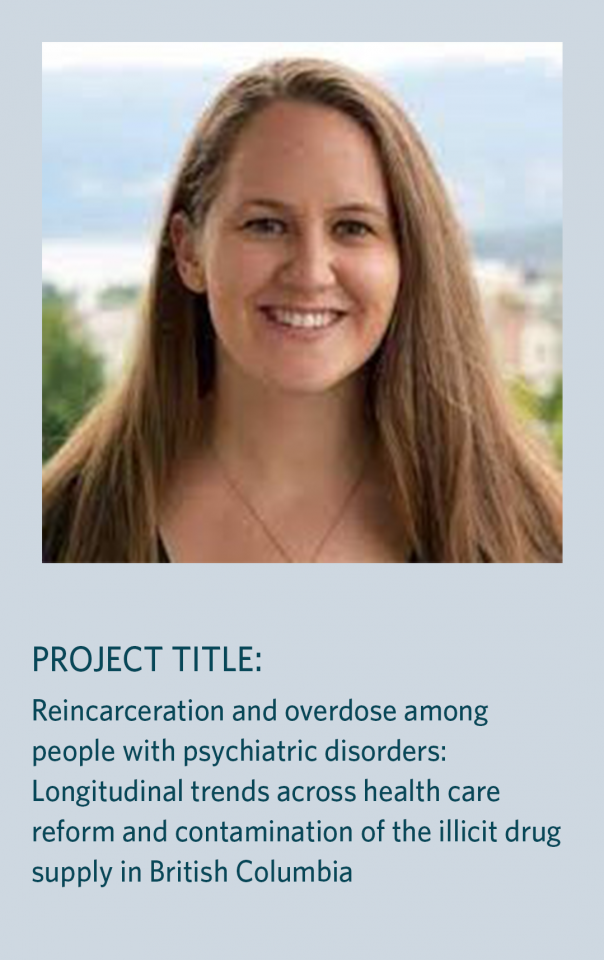
DR. HEATHER PALIS
FELLOW
In her second year as an IMH Marshall Fellow, Dr. Palis will continue to pursue studies to advance the health and well-being of people who use substances and are involved in the criminal justice system. Her project is utilizing the BC Provincial Overdose Cohort (BC-ODC), a linked administrative health and corrections dataset, to ascertain the effects of the health services transfer on reincarceration and overdose among persons with psychiatric disorders and criminal justice system involvement (CJSI). Her study’s objectives include describing the epidemiology of polysubstance use and overdose among people with psychiatric disorders, identifying trends of: a) health services utilization; b) reincarceration; and c) non-fatal and fatal overdose before and after the transfer among persons with CJSI involvement with and without psychiatric disorders, and identifying health services utilization characteristics that have a protective effect on risk of reincarceration and fatal and non-fatal overdose among people with psychiatric disorders.
Supervisors: Dr. Amanda Slaunwhite & Dr. Tonia Nicholls
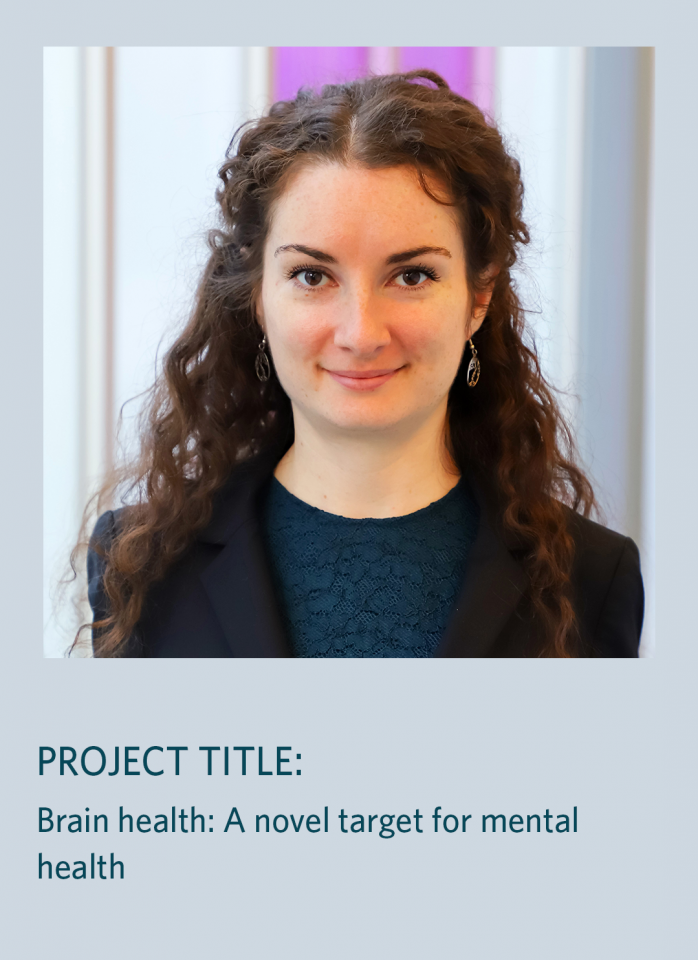
DR. NICOLE SANFORD
FELLOW
In her second year as an IMH Marshall Fellow, Dr. Sanford will continue to build upon prior research that has established that major psychiatric disorders, notably schizophrenia (SCZ), bipolar disorder (BD), and to a lesser degree major depressive disorder (MMD), are associated with accelerated brain aging, reflected in a higher Brain age gap estimation (BrainAGE) in patients as compared to healthy individuals. Her project is targeting the two most significant unanswered questions with regards to accelerated aging in major psychiatric disorders: namely, how early it can be detected and what are the key environmental drivers. Addressing these key issues is the crucial first step towards early detection of accelerated aging and effective intervention to minimize modifiable risk factors.
Supervisor: Dr. Sophia Frangou
Fellows & Scholars 2020/2021
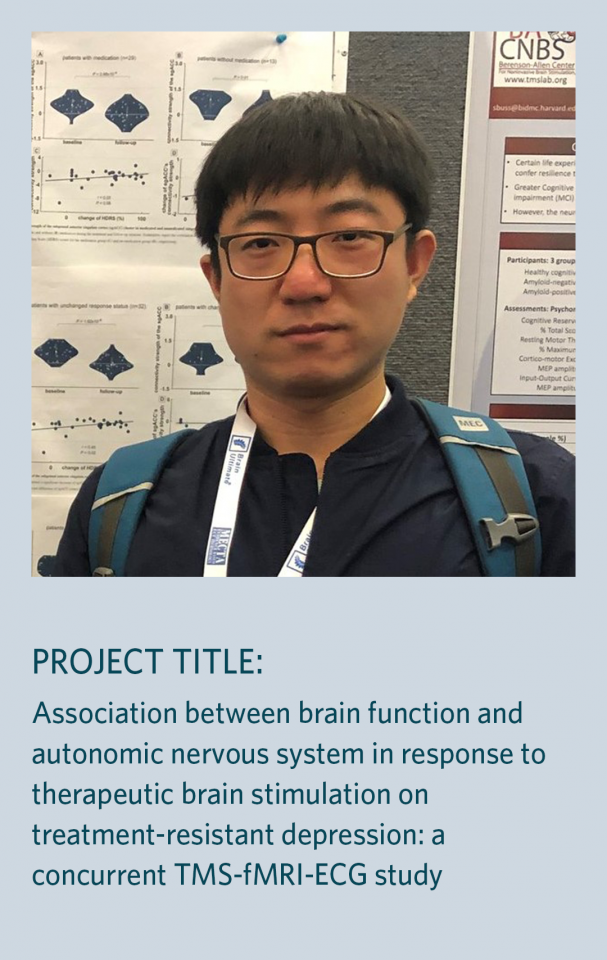
DR. RUIYANG GE
FELLOW
Dr. Ge’s research centers around the study of neuroimaging in healthy population and patients with psychiatric disorders. As evidence supports the notion that there is an association between rTMS treatment induced changes in brain function and autonomic nervous system, understanding this association is important for translational purpose because an avenue for identifying a functionally meaningful stimulation target for rTMS treatment is to probe the brain-heart connection. Dr. Ge’s project aims first to interrogate the association between rTMS treatment induced changes in brain function and autonomic nervous system. The secondary aim is to test whether the fMRI data and heart rate varilability (HRV) metric serve as potential predictors for treatment response of the following 4-week rTMS treatment.
Supervisor: Dr. Fidel Vila-Rodriguez
(Dr. Ge was appointed as a Research Associate within Dr. Sophia Frangou’s research group in January 2021)
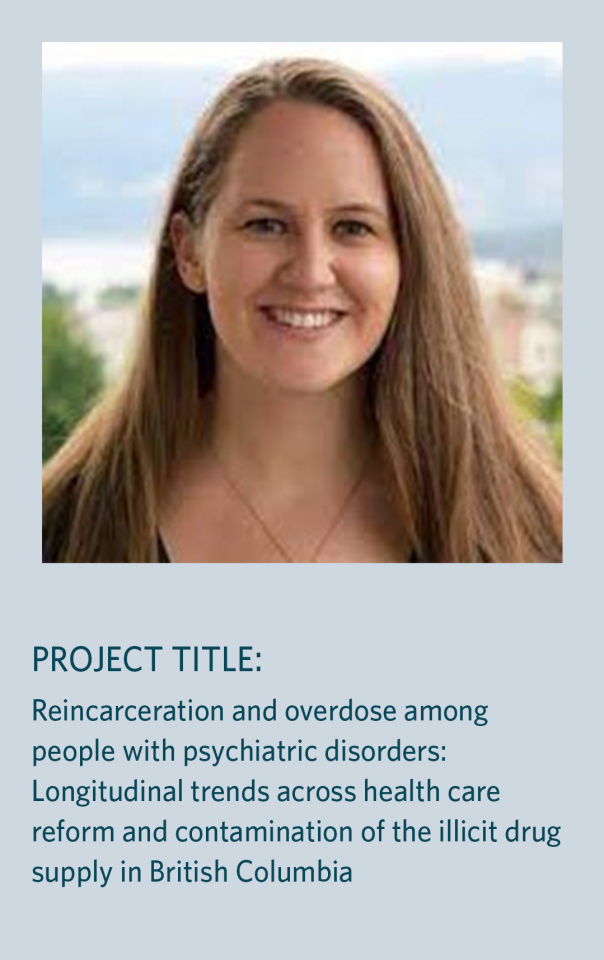
DR. HEATHER PALIS
FELLOW
Dr. Palis is currently engaged in studies to advance the health and well-being of people who use substances and are involved in the criminal justice system. Her project will utilize the BC Provincial Overdose Cohort (BC-ODC), a linked administrative health and corrections dataset, to ascertain the effects of the health services transfer on reincarceration and overdose among persons with psychiatric disorders and criminal justice system involvement (CJSI). Her study’s objectives include describing the epidemiology of polysubstance use and overdose among people with psychiatric disorders, identifying trends of: a) health services utilization; b) reincarceration; and c) non-fatal and fatal overdose before and after the transfer among persons with CJSI involvement with and without psychiatric disorders, and identifying health services utilization characteristics that have a protective effect on risk of reincarceration and fatal and non-fatal overdose among people with psychiatric disorders.
Supervisors: Dr. Amanda Slaunwhite & Dr. Tonia Nicholls
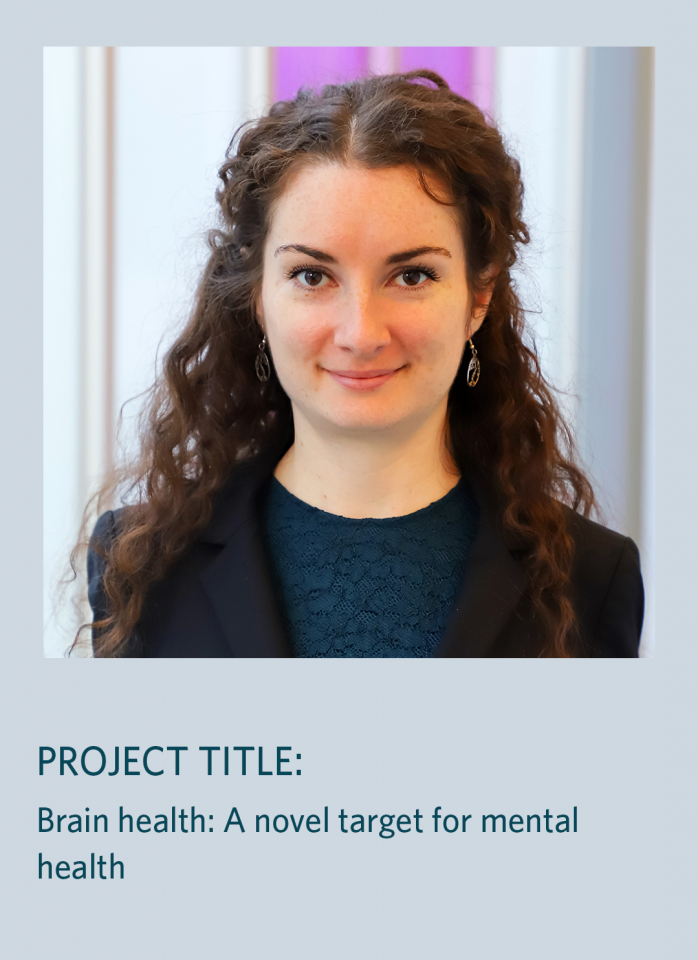
DR. NICOLE SANFORD
FELLOW
Dr. Sanford’s research seeks to build upon prior research that has established that major psychiatric disorders, notably schizophrenia (SCZ), bipolar disorder (BD), and to a lesser degree major depressive disorder (MMD), are associated with accelerated brain aging, reflected in a higher Brain age gap estimation (BrainAGE) in patients as compared to healthy individuals. Her project targets the two most significant unanswered questions with regards to accelerated aging in major psychiatric disorders: namely, how early it can be detected and what are the key environmental drivers. Addressing these key issues is the crucial first step towards early detection of accelerated aging and effective intervention to minimise modifiable risk factors.
Supervisor: Dr. Sophia Frangou
DR. GAYATRI SARAF
FELLOW
We know that there is a change in the function and structure of the brains in bipolar suffers, but the information we have acquired is from post mortem studies. We do not know the distribution and density of synapses in the living brain, nor do we know the precise neurochemical and mechanisms behind bipolar disorder. Dr. Saraf’s work will leverage recent technological advances in positron emission tomography (PET) scans to reveal these secrets and track the progression of the disease over time. There are no previous studies in bipolar disorder that have looked at the density of synapses, so she hopes to gain a greater insight into what happens in the brain tissue of people living with the disease and leverage this knowledge into innovative clinical treatments.
Supervisor: Dr. Lakshmi Yatham
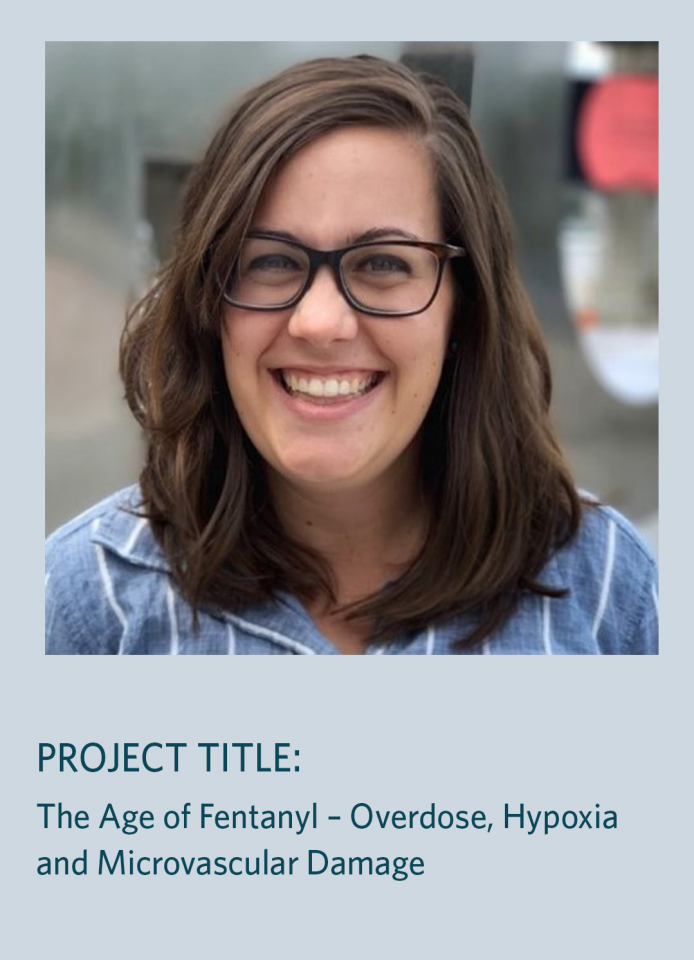
DR. MELISSA WOODWARD
FELLOW
Dr. Woodward is currently researching the innovative use of of ultra-high-resolution retinal imaging using optical coherence tomography (OCT), which allows the direct quantification of retinal nerve fibers and microvasculature using a non-invasive, quick eye examination, in the early detection of pathologies prominent in marginally-housed psychiatric populations. The objective of her project is to carry out an investigation using OCT imaging of the retina in an impoverished population in Vancouver’s Downtown Eastside, in order to assess damage to the blood vessels of the retina and to see if this helps to explain the relationship between fentanyl use and clinical factors like impaired thinking abilities and psychiatric symptoms.
Supervisor: Dr. William Honer
SCHOLARSHIP AWARDEES AND RESEARCH TITLES
ASHLEY BATTAGLINI
Intra- and Interpersonal Emotion Regulation in Major Depressive Disorder
ARIANA CAHN
Quantification of cortical thickness changes in bipolar disorder patients following first episode mania: A prospective study
MALLORY FLYNN
Estimating the True Incidence of Accidental Illicit Drug Overdose
TONY FONG
High Throughput Platform to Assess and Manipulate Cortical Circuits in Mouse Models of Depression
ALLISON GIESBRECHT
Understanding the Healthcare Access Experiences of Mental Health and Substance Use High Users of Healthcare
TRISTAN HYNES
Toward a Precision Treatment for Addiction: Focus on Dopamine Circuits and Sex
BONNIE LEE
The Impact of Motherhood and APOE Genotype on the Aging Brain
DAPHNE LING
The Neural Basis of Low-Dose versus Normal-Dose Psychostimulants on Executive Functions in Youth with Attention-Deficit / Hyperactivity Disorder: A Randomised Controlled Trial
MELANIE LYSENKO-MARTIN
Neural and Behavioral Substrates of THC-Induced Impairments in Decision Making
ALEXANDER MORIN
Integrating transcription factor binding and perturbation data to understand gene regulation in the brain
RAE MORRIS
Mental Health Service Provision with Adults with Autism Spectrum Disorder: An Interpretive Description Study
SHAWNA NARAYAN
Exploring cultural responsiveness in e-mental health resources for depression and anxiety (CREDA)
MAYA NESBIT
Preclinical Study of d-govadine and its Effects on Corticostriatal Mechanisms of Amphetamine Addiction
BOAZ SAFFER
Identifying the Neurocognitive Mechanisms of Suicidal Behaviours in Emerging Adults
JEAN WESTENBERG
Rapid micro-induction of buprenorphine/naloxone for treatment of Opioid Use Disorder
Fellows & Scholars 2019/2020
DR. TRAVIS HODGES
FELLOW
Dr. Hodges is researching the neural mechanisms that underpin pessimistic thinking, a common aspect of depression. His research pays particular attention to how it differs according to age and sex. He says, “We see lots of treatments based on research solely done in adult males. However, we’ve found in our lab that many treatments do not work the same in females, so we want to see if there are sex-specific effects on pessimism related to inflammation and the growth of new neurons in the brain. My background includes a lot of study in the different ways that stressors affect the adolescent brain, so my research as a Marshall Fellow will hopefully lead to multiple treatments tailored for groups susceptible to cognitive symptoms of depression, such as teenage girls.”
Supervisor: Dr. Liisa Galea
DR. EMMA MORTON
FELLOW
Dr. Morton’s work investigates the growing evidence that people can have a good quality of life despite the symptoms they experience from mood disorders. She will look at large-scale data sets that have been collected through various UBC studies to determine how quality of life relates to other variables and how it responds to treatments. A smartphone app will be created to enable people with bipolar disorder track their quality of life, and all of this data, along with other information such as screen time and physical activity will be analyzed using machine learning, which is a type of artificial intelligence that studies data to build mathematical models and make predictions. These will be used to direct people to strategies which might help improve their quality of life.
Supervisors: Dr. Erin Michalak
DR. KATARINA RNIC
FELLOW
Dr. Rnic’s work looks at how cognitive control—the brain’s ability to control the contents of its awareness at a given time—is involved in the onset of an episode of depression. People suffering from this illness have cognitive control biases, where they become stuck in a feedback loop of negative information. Dr. Rnic aims to create a novel cognitive control program to train depressed patients to inhibit this negative information and regulate their emotions. This training program will be something that is easily disseminated to clinicians, and even patients; they will be able to access it online, meaning that it has the potential to reach people in rural communities who don’t have access to care. It also has potential for patients who may not wish to use medication, such as pregnant women.
Supervisors: Dr. Joelle LeMoult and Dr. Raymond Lam
DR. GAYATRI SARAF
FELLOW
We know that there is a change in the function and structure of the brains in bipolar suffers, but the information we have acquired is from post mortem studies. We do not know the distribution and density of synapses in the living brain, nor do we know the precise neurochemical and mechanisms behind bipolar disorder. Dr. Saraf’s work will leverage recent technological advances in positron emission tomography (PET) scans to reveal these secrets and track the progression of the disease over time. There are no previous studies in bipolar disorder that have looked at the density of synapses, so she hopes to gain a greater insight into what happens in the brain tissue of people living with the disease and leverage this knowledge into innovative clinical treatments.
Supervisor: Dr. Lakshmi Yatham
DR. MELISSA WOODWARD
FELLOW
Dr. Woodward is researching the innovative use of existing technology: eye scans. Her project will use retinal imaging similar to what an eye doctor would use. These high-resolution images give a more detailed picture of the retina and blood vessels, however. Any changes in them may indicate changes in the brain—there is lots of evidence that people with schizophrenia show differences in their retinas—and point to possible cardiovascular issues too. Her doctoral work was about the impact of exercise on people with psychosis. People get overwhelmed by mental illness, and exercise is something that can greatly improve quality of life. Figuring out who needs early cardiovascular care in a cheap, effective way has significant clinical implications and can reduce the strain on healthcare budgets by allowing us to reduce the number of people undergoing MRI scans
Supervisor: Dr. William Honer
SCHOLARSHIP AWARDEES AND RESEARCH TITLES
ARIANA CAHN
Quantification of Volumetric Brain Changes in Bipolar Disorder Patients following First Episode Mania: A Prospective Study
RAND EID
Microglia as Targets of Estradiol-Mediated Stress Resilience
TONY FONG
High Throughput Platform to Assess and Manipulate Cortical Circuits in Mouse Models of Depression
TRISTAN HYNES
Toward a Precision Treatment for Addiction: Focus on Dopamine Circuits and Sex
BONNIE LEE
The Impact of Motherhood and APOE Genotype on the Aging Brain
DAPHNE LING
The Neural Basis of Low-Dose versus Normal-Dose Psychostimulants on Executive Functions in Youth with Attention-Deficit / Hyperactivity Disorder: A Randomised Controlled Trial
MELANIE LYSENKO-MARTIN
Neural and Behavioral Substrates of THC-Induced Impairments in Decision Making
RAE MORRIS
Mental Health Service Provision with Adults with Autism Spectrum Disorder: An Interpretive Description Study
MAYA NESBIT
Preclinical Study of d-govadine and its Effects on Corticostriatal Mechanisms of Amphetamine Addiction
MATTHEW NOSEWORTHY
Comparing the Cognitive Effects of Outdoor Versus Indoor Walking among Community-Dwelling Older Adults
RACHAL PATTISON
Examining Mental Health Differences Among Transgender and Gender Non-Conforming Youth: A Mixed Method Approach
TRISTAN JOSHUA PHILLIPE
Sex Differences in Stress Habituation and Serotonin 1A Receptor Function
WANSU QIU
Effects of Maternal Postpartum Corticosterone and SSRI Exposure on Cytokine Profile and Microbiome in Dams and Offspring
JACOB STUBBS
Characterizing the Impact of Traumatic Brain Injury on the Mental Health and Brain Structure of Homeless and marginally House Individuals in a Community-Based Study
BOAZ SAFFER
Identifying the Neurocognitive Mechanisms of Suicidal Behaviours in Emerging Adults